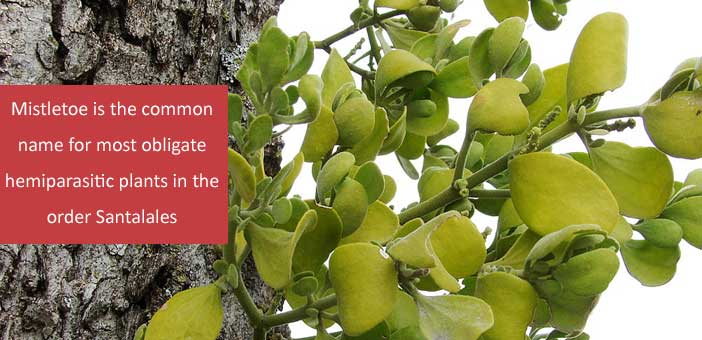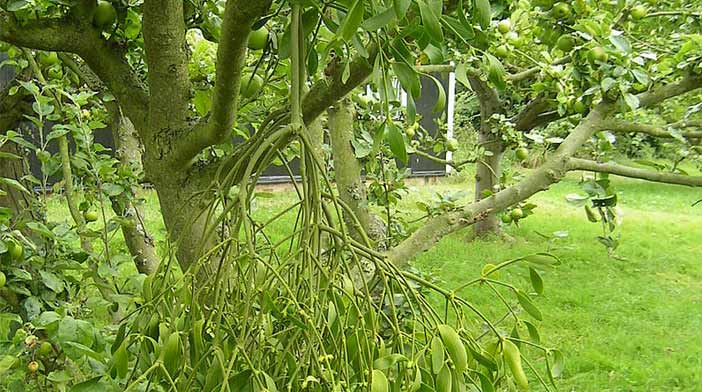There are countless varieties of Mistletoe – 900 species spread across 73 genres! The diverse range of this species has triggered speculation that it is a toxic parasite. But not all Mistletoes are bad. According to folk medicine, the European Mistletoe has medicinal properties and was considered magical. A fertility symbol in traditional European medicine is touted to help manage blood pressure, inflammation, and respiratory ailments and even prevent cancer.
Why Should You Use Mistletoe and its Health Benefits?

1. Beneficial during cancer treatments
According to studies, using Mistletoe during chemotherapy helps in easing and diminishing the negative impacts of radiation and chemotherapy. Another European research suggests it has innate anti-cancerous properties that enable it to recuperate faster. The harmful effects of using it have very little.
Mistletoe has shown signs of killing cancer cells and boosting the immune system in the laboratory. However, it is not yet fully proven whether this boost helps fight cancer.
2. Helps with diabetes management
The studies on this herb’s hypoglycemic properties are in the research stage, yet whatever laboratory results are available shed a ray of hope. According to the study conducted in vitro, this herb can stimulate insulin synthesis, improving insulin sensitivity. It also showed a positive impact on managing glucose levels in the blood. European people have reportedly been using this herb as a potent anti-diabetic natural remedy.
According to another research, African Mistletoe has a fair amount of anti-diabetic properties, but its activity is also dependent on the host species of the plant.
3. Cure for respiratory ailments
Mistletoe has the power to calm down irritated airways and bronchioles, thereby easing chronic coughs. The anti-inflammatory nature of the herb soothes inflamed lungs, offering a potential natural cure for respiratory ailments like bronchitis and asthma.
4. Beneficial for pain management & Muscles
The topical application of this herb as a poultice helps relieve pain instantly. Hence, it has been a powerful home remedy for painful, inflammatory conditions like sciatica and gout.
This hemiparasitic plant has sound effects on muscles primarily found in the intestines, arteries, and uterus. It possesses properties that help in calming these muscles. This, in turn, helps in health conditions like dyspepsia and indigestion. However, hypertension patients should avoid it due to its side effects.
5. Good for your cardiovascular health
Mistletoe has an impeccable effect on high blood pressure. It helps lower blood pressure, alleviating the pressure on the cardiovascular system. It also prevents the shrinkage of arteries, one of the significant triggers of atherosclerosis. Thus, Mistletoe cares for your cardiovascular system and lowers the risk of lethal conditions such as stroke and coronary heart disease. Try using the Japanese or European variants to reap the anti-hypertensive properties of Mistletoe.
6. Beneficial for women
Folk medicines suggest using this anti-spasmodic herb to prevent and ease menstrual disorders like cramps and heavy blood flow. According to traditional women of Europe, regular use of this herb could cure uterine disorders and improve fertility.
7. Helps in soothing your nervous system
Mistletoe is one of the most prominently used natural solutions to ease stress, calm your nerves, and relax the entire body. This could be why it has been used as a natural antidote for insomnia, anxiety attacks, and depression.
8. Good for gastrointestinal health
Inflammation of the gut impacts the entire health. This herb could tame inflammation and promote gut health by boosting digestion and treating other gastrointestinal troubles.
9. Improves immunity
A compound present in this herb is known to boost the immune system and shield you from chronic, recurring illnesses. It also has powerful antiviral, antioxidant, and antibacterial properties, making it a perfect immune-booster.
Nutrients and Components of Mistletoe
| Component | Description |
|---|---|
| Lectins | Proteins that bind to sugar molecules, with anticancer effects. |
| Viscotoxins | Proteins for immune system. |
| Polysaccharides | Sugar molecules to boost the immune system. |
| Flavonoids | Polyphenolic compounds with antioxidant properties. |
| Alkaloids | Nitrogen-containing compounds. |
| Triterpenes and Sterols | Anti-inflammatory and anti-tumor effects. |
FAQs on Mistletoe
How to use Mistletoe?
You can use Mistletoe in the form of tea. After cleaning them thoroughly in 250 ml cold water, chop one teaspoon of mistletoe leaves. Keep it at room temperature for 12 hours before consuming.
Where can I buy Mistletoe?

Mistletoe is available primarily in UJ, Netherlands, and Switzerland. It is available in drug stores with the name Helixor. The injection is approved in Germany and is used to tone down tumors and relieve patients’ uneasiness.
It is only available for clinical trials in the USA and not at drug stores. However, its diluted form is available, which is often mixed with alcohol or water. If you want to give it a try, talk to your doctor.
What are the side effects of Mistletoe?
Certain studies indicate the side effects of using Mistletoe.
- Pregnant women should be cautious using this herb as it could induce a miscarriage by stimulating the uterus.
- While there is much said and written about this herb’s anti-cancerous properties, there are also some contradictory findings. There are cases where using European Mistletoe has worsened the symptoms of leukemia.
- If you are already on anti-hypertensive drugs, be extremely careful while using this herb as it could dangerously lower the level of blood pressure.
- Stop using European Mistletoe 15 days before your surgery, as it could impact the blood pressure levels.
- There is a theory that using this herb could negatively impact liver health.
- no scientific evidence offers any information regarding the appropriate dosage and usage of European Mistletoe. So, please be very careful! Check with your doctor before using this drug and adhere to the dosage and directions he gives you to avoid undesirable negative impacts.
Have you ever used Mistletoe? What was your experience? Please share with us.

9 Comments
Ive just started using it to reduce my sugar level. i take it as tea nut boiled. I just learned that I dont have to boil it but can suck it for 12 hours. The effect is quite soothing. When i take it, i feel sleepy and almost drowsy but I wake refreshed. Pls can u explain more on the side effect on the liver. Thanks
High doses of mistletoe lectins could sometime damage the liver in not so common cases. However, the good news is that this damage is correctable.
1. Can an aged person of about 80 years and above take mistletoe?
2. Can a person suffering from low blood pressure take mistletoe?
Please consult a doctor. Blood pressure is a delicate condition and if the person is about 80, it becomes even more delicate. Do not take any herb without consulting your doctor.
I used this herb in treating many ailments with about 100% positive results. It’s just about the right dosages, at what time and at what quantities a client needs. It is the best herb ever, since I got to know alternative medicine.
I have been using dis herbs for 1 month now when I started using it I feel much better and my blood pressure reduced. But, for some days now my blood pressure has been rising to what it used to be. Please, what should I do?
Please contact a doctor. In case of blood pressure, you should not start or stop any medication/herb without consulting your doctor.
I drink mistletoe tea for the side effect for a full week I did well then people say my skin is a little bit dark I stop now the side effects came back in my head and body so now this time I make me a cup of tea and try to stay on and finish the programme I got a book on the programme of it to help me please.
pls where can i get the mistletoe leaves from